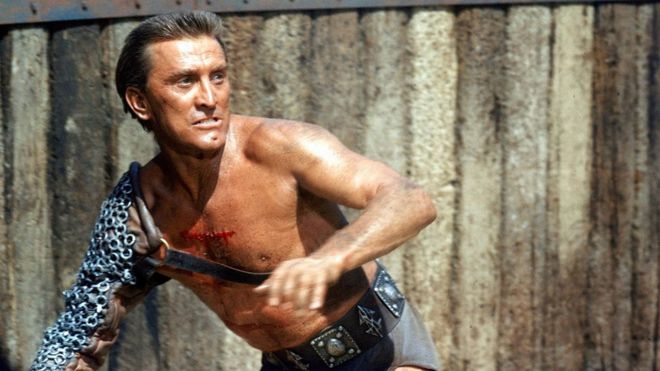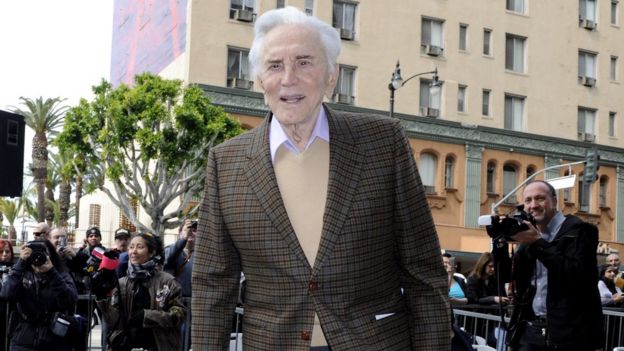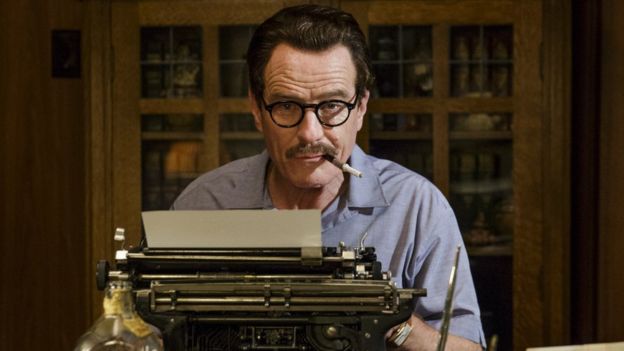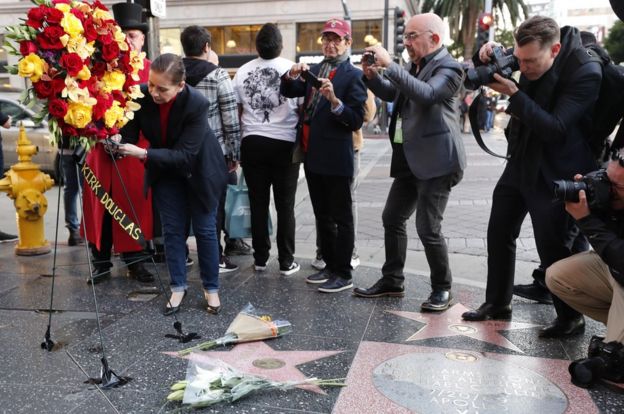How Kirk Douglas helped break the Hollywood blacklist
 GETTY IMAGES
GETTY IMAGES
There was one problem when Kirk Douglas saw the original script for the 1960 film Spartacus.
It wasn't very good.
The actor, who died on Wednesday aged 103, had optioned the rights to Howard Fast's novel - and the film would go on to become Douglas's best-known movie.
The star originally enlisted the author to adapt his own work for the big screen, but Fast was not used to writing screenplays and struggled with the format.
Douglas urgently needed someone to rescue the script before the historical epic went into production.
That sparked a sequence of events which helped end the so-called Hollywood blacklist - the 1950s ban on scriptwriters and film-makers with alleged communist sympathies.
 EPA
EPA
When it came to producing movies, Douglas was a perfectionist.
"He was a person who had integrity," Tim Gray, senior vice president at Variety magazine, told BBC Radio 4's Today programme. "He'd be the first to admit that he wasn't easy to work with, but he was always fighting to make a better film."
Douglas hired Dalton Trumbo to rewrite the script for Spartacus, which Trumbo did in just two weeks.
But Trumbo had been a member of the Communist Party in the 1940s, so was blacklisted by Hollywood at the end of the decade.
He and nine other writers and directors, collectively known as the Hollywood Ten, were jailed for contempt of Congress in 1950 after refusing to co-operate with authorities, who were on the hunt for communists and sympathisers.
 SKY
SKY
A pamphlet circulated at the time identified 151 professionals in the entertainment industry who were thought to be communists.
Those named could no longer work in Hollywood - at least not using their real names. And if they did keep working under pseudonyms, they had to do so at very cheap rates.
In his 2012 memoir I Am Spartacus!: Making A Film, Breaking The Blacklist, Douglas wrote about hiring Trumbo, who planned to rewrite the script under the name Sam Jackson.
"I gave my new friend 'Sam' a copy of the book and he promised to read it right away," Douglas said. "I had been thinking a lot about the day when the blacklist would end."
'A tremendous risk'
It became widely known in Hollywood that Trumbo had written Spartacus. A gossip columnist, Walter Winchell, ran an item in March 1959 outing him as the screenwriter.
That perhaps paved the way for what Douglas did next.
Douglas said he told Trumbo that once the film was finished, "not only am I going to tell them that you've written it, but we're putting your name on it".
In August 1960, the studio Universal-International announced that the writer would receive a full screen credit as Dalton Trumbo.
The blacklist was effectively broken.
"The masquerade was over," Douglas later wrote. "All my friends told me I was being stupid, throwing my career away. It was a tremendous risk. But the blacklist was broken.
"I wasn't thinking of being a hero and breaking the blacklist. It wasn't until later I realised the significance of that impulsive gesture."
In fact, Douglas claimed to have first broken the blacklist nine months earlier by requesting that Universal Studios issue a parking pass for Trumbo - which was significant because it was issued under the writer's real name.
Either way, Rebecca Keegan, senior film editor at the Hollywood Reporter, told BBC Radio 5 Live that Douglas's actions were "pretty extraordinary".
"It was a radical thing to do at the time, it was a huge statement," she said. "Douglas put his real name in the credits. It was one of the most significant acts in ending the use of the blacklist, which had had such an oppressive effect in Hollywood."
Keegan says Douglas used his star power to make sure Trumbo got the credit he deserved.
"The fact that Hollywood was using these blacklisted screenwriters, paying them pennies on the dollar, and not allowing them to use their real names, he thought that was absurd," she explained.
"And he had enough power at that point that he could make a decision like that and have a profound impact on the industry."
Later in his career, Douglas revelled in telling people how he had broken the blacklist.

But some have argued that he overstated the part he played.
Trumbo's daughter, Melissa, said that when his 2012 book was published, she "threw it across the room".
In 2002, Trumbo's widow Cleo wrote a letter to the LA Times saying "no single person can be credited with breaking the blacklist".
Nonetheless, Douglas became the public face of the blacklist rebellion, which would have taken some courage in itself, even if just as one member of a growing movement.
Speaking to the Jewish Chronicle in 2012, Douglas said: "I have been working in Hollywood over 60 years and I've made over 85 pictures, but the thing I'm most proud of is breaking the blacklist."
No comments:
Post a Comment